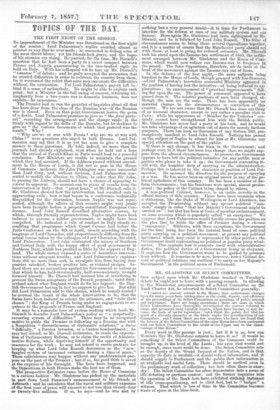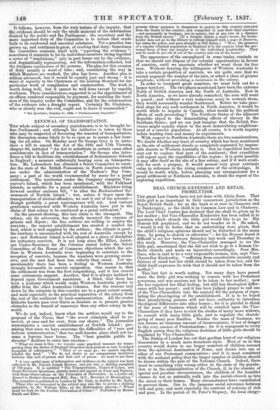MR. GLADSTONE ON SELECT COMMITTEES.
ONE subject upon which Mr. Gladstone touched in Tuesday's debate he ought not to leave with a passing remark. In alluding to the Ministerial announcement of a Select Committee on the Bank Charter Act, he adverted to Select Committees generally.
"I cannot too gravely submit to the House, that unfortunate changes have for many years been taking place in the credit, dignity, and efficiency of the proceedings of its Select Committees on questions of public interest and importance. There arc happy exceptions ; there are cases in which Select Committees have thoroughly investigated the matters referred to them, and presented most valuable reports, which have become, or may become, the basis of useful legislation ; but I think the public feel that too much of a slovenly character on the whole marks the investigations of our Committees : and I think there are few members who have not found that the labours of the Select Committees of the other House have been contrasted with our Select Committees to the credit of the Upper and to the disadvantage of this House."
Every word in this passage is just ; but if it is so, how can Members like Mr. Gladstone consent to leave it so ? It would be something if the Select Committees of the Commons could be brought up to the level of the Lords; but even that would not be enough, since more could be done. The Select Committee acts as the deputy of the Grand Inquest of the Nation, encl, in that capacity its duty is twofold—it should collect information, and it should supply to Parliament and the public that information in an available and useful form. There should be method oven in the preliminary work of collection; but how often there is anarchy ! The Select Committee too often degenerates into a scene of idle debating or partisan contest; and the former inquiries into the operation of the Bank Acts have exhibited striking instances of idle cross-questioning, not to elicit fact, but to " badger" witness. That which is loss of time in the Committee becomes waste of space in the blue-book.
It follows, however, from the very nature of the inquiry, that the evidence should be only the crude material of the information desired by the public and the Parliament : the secondary and the more important duty of the Committee is to reduce that crude bulk to its condensed and essential substance. Yet a practice has grown up, and continues to grow, of evading that duty. Sometimes the Committee contents itself with "reporting the evidence "; sometimes it consents to let its individual members string together a series of "resolutions," only in part borne out by the evidence, and dogmatically representing, not the information collected, but the foregone conclusions of the persons. The plea for this evasion of duty usually is want of time; and, considering the way in lithich Members are worked, the plea has force. Another plea is seldom advanced, but it would be equally just and strong : it is want of capacity in the Chairman or the 1ewling Members for the particular work of compilation and condensation. The work is worth doing well, but it cannot be well done except by capable workmen. These considerations suggested to us the appointment of an officer, rendered responsible by payment, for assisting the business of the inquiry under the Committee, and for the condensation of the evidence into a draught report. Certainly Mr. Gladstone, who so clearly sees the evil, ought not to leave it unamended.*
• See Spectator, October 11, 1856—" Parliamentary Inquiries."



































 Previous page
Previous page